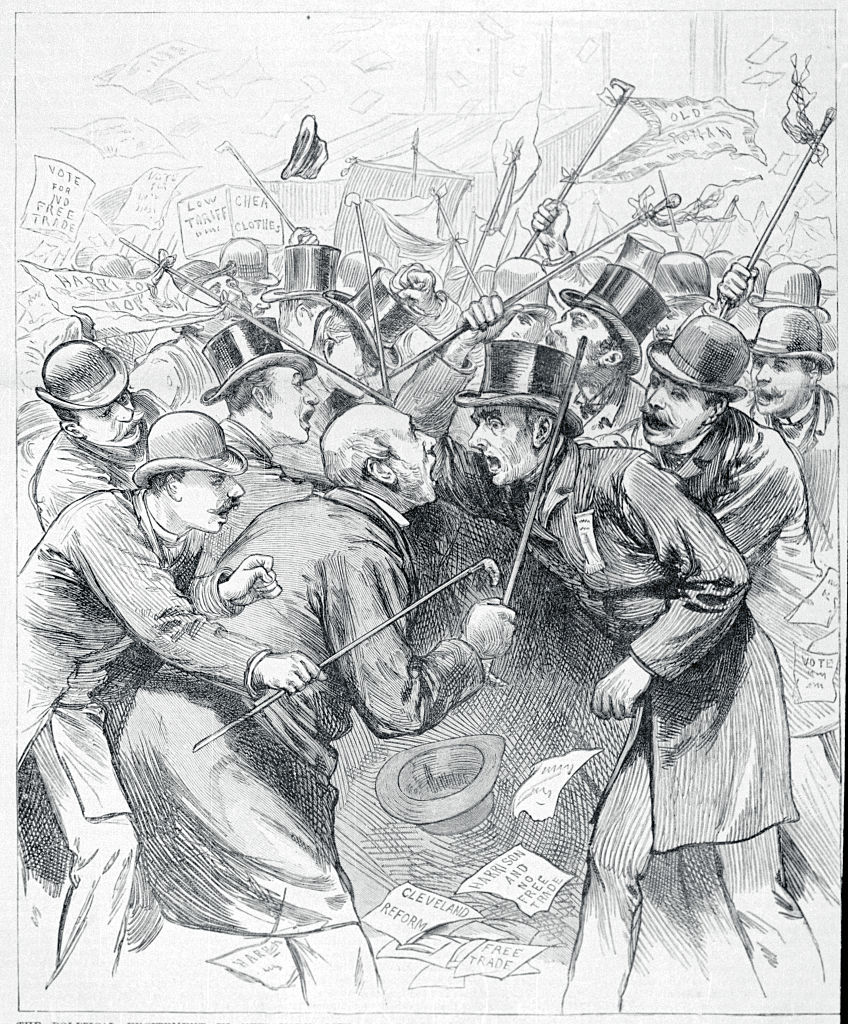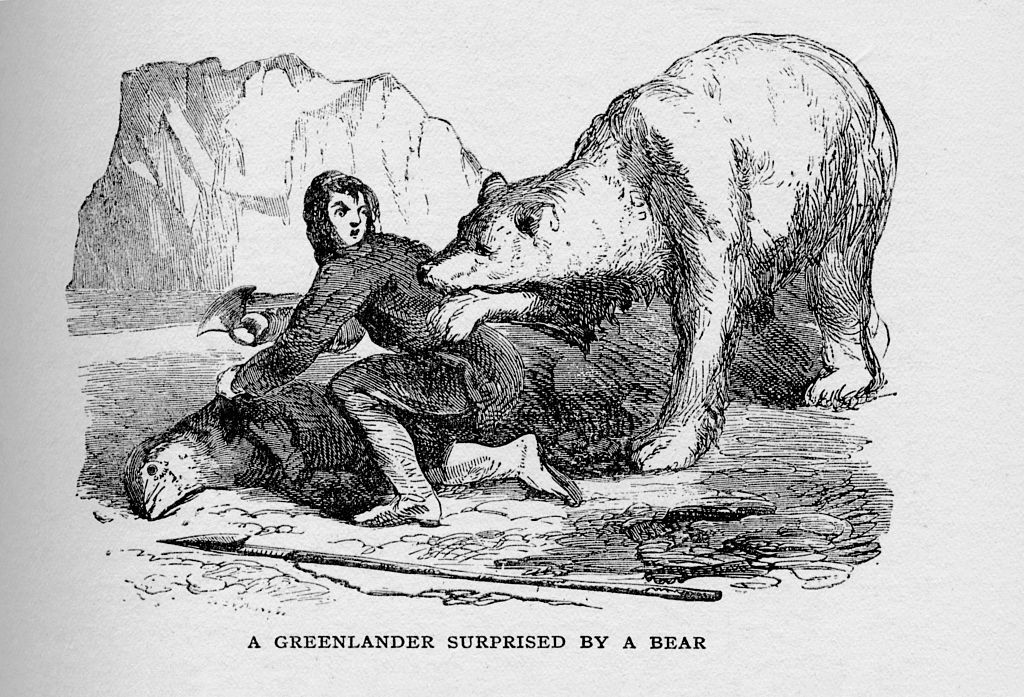It has become cliché to say that the advent of the second Trump administration has thrown the world into chaos. Just look at what we are told around the clock by experts, opinion makers, the media and pretty much anyone with a view on the matter. They are all competing in hyperbolic language to describe the state of the world. We hear of convulsions, tectonic changes, epochal transformations, mayhem and disarray in foreign affairs – all, of course, stemming from the White House’s new policies which are almost universally being described as “destructive” and “destabilising”.
In the shaken telling of much of the Trans-Atlantic community, the revised direction of US foreign policy presages unmitigated catastrophes. Ukraine is being thrown under the bus, we are told; Canada and Greenland are being targeted for US conquest; Europe is suddenly left at best defenceless, at worst a prey for both Trump’s and Putin’s equally-wicked quests for dominance. The tariffs are seen as almost akin to a declaration of war. Indeed, in the view of many sufferers of Trump Derangement Syndrome, America has transformed overnight from the continent’s key ally and security guarantor into its whip-wielding master, even enemy.
No wonder that nerves have snapped, even amongst the smartest, most cerebral and sensible of European and British observers, for whom total calamity is at hand and defence spending must – must! – be doubled or tripled if we are to stand a chance at avoiding some kind of “1930s”-something. As noted in these pages before, the very fact that “the 1930s” keeps recurring in our debates as, apparently, one of the only historical references for an otherwise largely strategically-illiterate “expert” class (see the West’s global strategic track record post-1992), gives the measure of just how low the conversation has fallen.
The universal response from the panic-stricken foreign policy elites to these recent “shocks” – especially in the Old World – has been wailing, fear and loathing, combined with grand rhetoric about having to mobilise like never before to meet some impending apocalypse triggered by Orange Man. It has all been a Godsend for caricature “leaders” with delusions of grandeur like Macron who now get to play at “statesmanship” one more time and pretend to be “saving democracy”, or the world, or something. For them, the more drama, the better; it is in their own and their respective factions’ political interest to crank up the doom-mongering to the max.
As usual, in reality most of the actual policy reaction is just posturing (e.g. deployments to Ukraine) or straight-up lies, such as Ursula von der Leyen’s famed “800 billion euros for defence” which is a complete fabrication based on money that does not exist.
The new European trend in favour of an opening to China, as a supposed answer to Trump’s tariffs, is only the silliest of a series of responses to Trump from a demonstrably incompetent “strategic community” and political class, driven largely by hype and emotion rather than any serious rational analysis. This is also the reason why critiquing – or rather, ridiculing – the massive shakeup of the US Government by Trump’s team has become such a popular sport in Europe in particular.
The hyper risk-averse and geopolitically failing European elites have long lost contact with reality and believe that any radical change to the world as they knew it until five minutes ago is bound to be a disaster – but what they really mean is, a disaster for them. Hardly anyone is asking what were the risks of continuing as we were, on the trajectory, reinforced by elite consensus, that had brought the entire West almost to its knees in a mere three decades – with war in Europe and a China turned superpower – starting from a position of unquestioned dominance in the years after the fall of the Soviet Union.
What exactly is this big crisis that we are told is about to befall us? Even if the United States is indeed bent on loosening its ties to European allies and pursuing a new détente with Russia – on the precedent set by Nixon and Kissinger – how would this justify the apocalyptic atmosphere and the angst and fury percolating through the cynical establishments of Europe? Surely it cannot simply be about the fate of Ukraine; even if the war did end with a negative result for Kiev, that would be unfortunate but not a direct problem for NATO and EU members as – despite the prevailing narrative – this is not their war and Ukraine is not a treaty ally. Harsh as this may sound, it is simply a statement of fact and a realist reading of the situation.
Rather, the real answer to the crisis question usually has to do with “Russia”, in the form of some presumed further Russian attack on Europe sometime in the future. But those who worry about what Putin might do next after Ukraine, are often the same people who, at the same time, maintain that “Russia has already failed”, who ridicule the performance of Russia’s armed forces in the field, and who believe that Russia is in fact very weak. So weak, they claim, that it is actually on the brink of collapse, if only the West were bold enough to push more strongly against it (via the Ukrainian proxy of course). The fact that there is a complete contradiction between the notion of a Russia ready to take on the whole of NATO, and a Russia that (presumably) can’t even defeat Ukraine, doesn’t seem to interfere too much with the task of crisis-manufacturing in Europe. What is more, these arguments precede Trump’s return to office.
However one views the Ukraine war – as a demonstration of Russian military strength, or weakness – there can hardly be any debate over its costs and destructiveness, and the sheer difficulty for the attacker in an age when the defence in general has such huge and amply demonstrated advantages on the battlefield, mainly as a function of technology, e.g. drones. If Putin’s invasion has proven anything, it is the near impossibility of “quick wins” in invading other nations, and the near certainty of a long, messy war that is likely to draw in other countries – all the more so when it comes to NATO allies, with or without US involvement.
Considering these facts, the question of exactly why would Putin or his successor unleash a new war in NATO Europe never seems to be seriously considered beyond trite assumptions about Putin’s supposed desire for conquest, as if he is some medieval king. And that question can only arise in the first place after Putin will have defeated and pacified Ukraine, since it’s folly to start another conflict before finishing the first – yet, again, the mainstream Western narrative is very clear that Ukraine cannot lose, and certainly that it would not be allowed by the West to lose.
A more “sophisticated” reasoning advanced by the Russia hawks on the “Russia threat” issue is that Putin would want to “test” Article 5 through a small incursion; if the Alliance’s response is less than unified, experts argue, NATO would be somehow “finished” because its core security guarantee would have been proven hollow. But, again, this entire argument is invalidated by the very story of Ukraine itself, a country which still received huge amounts of NATO support despite not being a NATO member, which it used to hold off the Russian attack.
If European nations were willing to give so much help even to a non-allied country, Putin would have to expect even more such help to be given to a NATO member if he (Putin) attacked it, irrespective of the formal state of the Alliance or of what the US would do. Russia would be all but guaranteed to not be able to achieve its military goals in such a campaign on NATO soil anytime soon, certainly not in the Baltic area which has now become a NATO lake. And once openly engaged in warfare on NATO soil, Europe’s collective demographic and economic superiority (even without the US), once mobilised, would leave Russia no hope of any meaningful victory in a long war. The European defence industrial capacity is already expanding: for example, Rheinmetall’s 155mm shell production has grown ten-fold since 2022, to 700,000 rounds per year; BAE Systems has achieved an eight-fold increase. Even if one harbours grave doubts about Europe’s ability to mobilise in a real war and avoid major initial losses, after the Ukrainian experience Russia could never be sure that it can actually bring the conflict to an early conclusion, in which case a war of attrition against Europe would likely be unwinnable for Moscow.
All this is to say that the risk of Russia looking to invade NATO post-Ukraine – if it ever brings Ukraine under its control – is in fact receding not increasing, irrespective of what America does. If anything, a US-brokered détente with Russia would only reduce that risk further by buying more time for the Europeans to increase their defence capabilities. Countries outside the European institutional boundary – i.e. outside NATO or the EU – such as Moldova or Ukraine itself at a later stage, might indeed come under Russian pressure or aggression in the future, but, again, from a historical perspective and from a European-self-interest point of view that would not automatically mean catastrophe for Europe itself.
Moving on from the Russian question and taking a step back, the only other dimension of US policy under Trump that could justify the crisis hype would be the general restructuring of the global security system at a grand strategic level. The new “trade wars” are part of this process and Trump’s tariffs function largely as a geostrategic tool for resetting global power dynamics and forcing new alignments in the international system – for example by using tariff negotiations to isolate China.
The idea that the US could be willingly terminating its “primacist” or “hegemonic” post-1945 role in favour of giving world order a final push back towards a multipolar or classic balance of power model, is inherently and deeply disturbing – first of all, psychologically – to many people across Western establishments.
Trump does not want America to play the “world policeman” anymore. Allies now suddenly realise they need to stand on their own feet a bit more, rather than Uncle Sam protecting them from bullies, and they resent Trump for it. But none of this means the sky is falling – merely that global affairs are reverting to their historically normal pattern of a multipolar, mercantilist-tilting world.
What awaits is a future where countries have to work a bit harder for their security through defence but especially through diplomacy, prioritise economic protectionism for security reasons, and forego the luxuries of liberal progressivism, “values”-promotion and moral righteousness in foreign affairs. It is not the end of the world, but the end of a world: an anomaly in human history when one country, America, exercised for a brief period global hegemonic power on a democratic basis and guaranteed both security and prosperity for its motley collection of Western allies who got to grow rich, fat, lazy and defiant in its shadow.
That unparalleled US power base – 50 per cent of world GDP in 1945, for example – has by now been severely eroded, and Washington’s authority and influence have frittered been away in the post-Cold War frenzy of globalist foolishness from Iraq to Afghanistan. With China now almost its equal or even surging ahead in many areas such as manufacturing, the old model of quasi-total US geopolitical dominance is untenable.
Choices about a turn to retrenchment and a different, pragmatic, diplomacy-first approach must be made in US policy – and, soon, in allied countries too, even though their elites are generally still stuck in an outdated, over-reaching mindset focused on “global power projection” and other such notions. These had they day, first in the age of empire, and then continued in that of US primacy. Now, if anything, it is isolationism that will be the next big wave in Western politics.
Contact with reality, at this time of change, is hard and uncomfortable. Risks and the demands on genuine statecraft (which is in very short supply in the West), increase. But none of this represents an actual crisis – except for those whose worldview is losing out.






Men at war, praise them all: strong backs, high skills, comradeship, courage